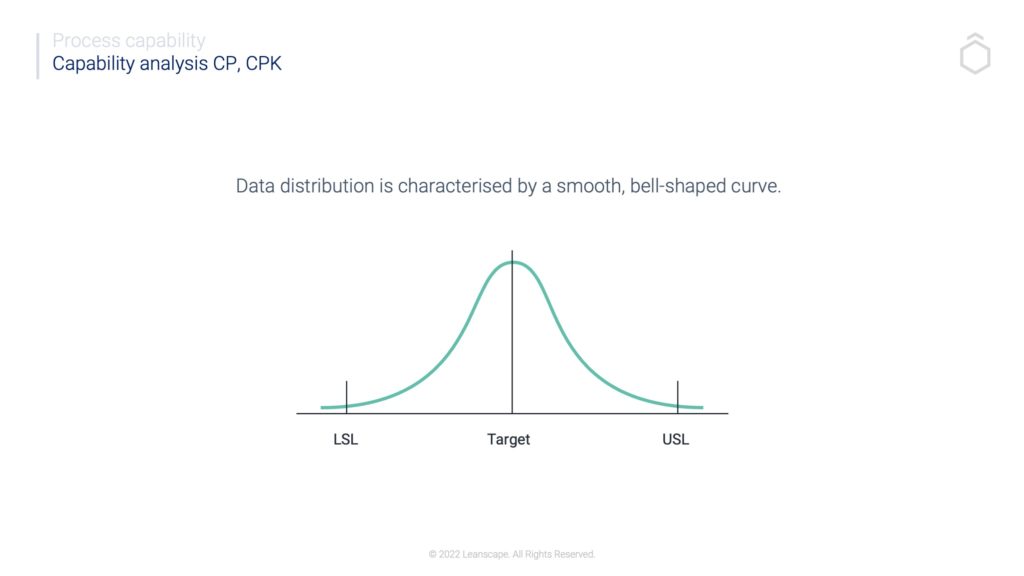Process Capability
Are you looking to improve your process capability? If so, you’ve come to the right place. In this post, we’ll be discussing what process capability is and how you can enhance it. By the end of this post, you should have a good understanding of what steps you need to take in order to improve your own process capability. So let’s get started!
Define process capability
Process capability is an instrumental concept within integrated quality management systems. It’s a measure of how well a process meets its pre-determined targets and specifications, emphasizing the importance of process capabilities in comparing process output to specification limits. Process capability considers both the precision and accuracy of a process in delivering those results. The higher the numbers associated with the process capability, the more precise and accurate it is deemed to be. Ultimately, processes that have high levels of process capability reduce waste and mistakes caused by variations in production whilst also greatly increasing customer satisfaction.
Understanding Process Capability Indices
Process capability indices are statistical measures used to evaluate a process’s ability to produce output within specified limits. The two most commonly used indices are Cp and Cpk. These indices are crucial for process improvement as they provide insights into how well a process meets customer specifications. By understanding and utilizing these indices, organizations can identify areas for enhancement and ensure their processes consistently deliver high-quality products.
Why is process capability important in Six Sigma and other quality improvement initiatives?
Process capability is a key component of any successful Six Sigma and other quality improvement initiative. A process capability study evaluates manufacturing and service processes to determine their ability to consistently meet specified requirements. It allows an organization to understand how their processes are performing against pre-defined targets, making it possible to identify process-related problems which need to be addressed in order for initiatives to be effective. Furthermore, with detailed process capability data, organizations can take proactive steps to improve the efficiency and performance of existing processes by avoiding conditions that lead to defects or unacceptable output within the process.
Process capability allows organizations to remain competitive while also aiming for continuous improvement in their operations. By recognizing and addressing process deficiencies before they become major issues, Six Sigma and other quality initiatives can make significant advances in an organization’s ability to produce high-quality products and services.
How to calculate process capability analysis
Calculating process capability analysis is a valuable tool for any organization wanting to ensure its production process is running smoothly and efficiently. The first step in calculating process capability is determining the upper and lower specification limits for the product being produced. This establishes the acceptable target range for the process output. Next, calculate the short-term variability with statistical process control tools such as X-bar and R charts.
With these data points, one can better understand how much variation there is in the production process when monitored over time – and where improvements can be made to help bring about superior performance in meeting customer demands. Finally, look at Cp and Cpk values which will deliver insight into the comparison of actual versus intended performance levels of the process as well as help you get an idea of how much potential improvement still exists. These capabilities are key to driving success long-term and creating a process of continuous improvement over time.

Calculating Process Capability Index (Cp)
The process capability index, Cp, measures the potential capability of a process to produce output within specified limits. It is calculated using the formula:
[ Cp = \frac{Upper\ Specification\ Limit – Lower\ Specification\ Limit}{6 \times Process\ Standard\ Deviation} ]A higher Cp value indicates a more capable process. However, it’s important to note that Cp does not account for the centering of the process. This means that while a high Cp value suggests a process can produce within specification limits, it doesn’t guarantee that the process is centered around the target value.
Calculating Process Capability Index (Cpk)
The process capability index, Cpk, provides a more comprehensive measure by considering both the process spread and its centering. The formula for Cpk is:
[ Cpk = \min \left( \frac{Upper\ Specification\ Limit – Process\ Mean}{3 \times Process\ Standard\ Deviation}, \frac{Process\ Mean – Lower\ Specification\ Limit}{3 \times Process\ Standard\ Deviation} \right) ]A higher Cpk value indicates a process that is not only capable but also well-centered within the specification limits. This makes Cpk a more reliable indicator of a process’s actual performance in meeting customer requirements.
Interpreting Process Capability Results
Interpreting process capability results is essential for driving process improvement and ensuring products meet customer specifications. Here are some general guidelines:
A Cp value of 1.00 or greater indicates that the process is capable of producing output within specified limits.
A Cpk value of 1.00 or greater indicates that the process is both capable and centered.
A Cpk value less than 1.00 suggests that the process is not capable of producing output within specified limits.
A Cpk value between 1.00 and 1.33 indicates that the process is barely capable, while a value greater than 1.33 signifies a capable process.
By understanding these values, organizations can pinpoint areas needing improvement and take targeted actions to enhance process performance.
Some real-world examples of process capability study in action
Process capability can be seen in any number of activities in the real world. Whether it’s software development, a well-defined manufacturing process, or customer service, having a clear understanding of process capability is essential for success. In software development, a focus on developing in smaller chunks and then testing and iterating can help reduce the need to do major refactoring down the line. In manufacturing, understanding variations in material supply and demand helps manufacturers run processes more efficiently and with fewer errors.
Similarly, customer service operations often benefit from analytics that inform better decision-making about how best to utilize resources and respond to customer inquiries quickly. Ultimately, having good process capability means being able to think ahead rather than reacting once problems arise – an invaluable skill for success in any endeavor.
Tips for improving your own process capability indices
Improving your own process capability scores can be a challenging task, but understanding your process’s ability to meet specific customer specifications can make it more manageable. However, it doesn’t have to be daunting! A few tips to start with include analyzing existing processes thoroughly using control charts, identifying underlying causes of variability, and responding to identified issues quickly and effectively. Taking on small projects regularly can also help you build up your expertise in this field, giving you more confidence that you’re following the correct procedures.
This will lead to measurable improvements in your ability to meet customer requirements. Lastly, listening to customer feedback and understanding their needs can help you recognize changes that should be made over time to make sure your process is running as efficiently as possible. All these pieces of advice work together to make sure that improving your own process capability score becomes easier than ever.
Setting Process Capability Goals
Setting process capability goals is vital for continuous process improvement and ensuring products meet customer specifications. Here are some guidelines for setting effective goals:
Aim for a minimum Cp value of 1.00 to ensure the process can produce output within specified limits.
Set a minimum Cpk value of 1.33 to ensure the process is both capable and centered.
Target a Cpk value of 2.00 or higher to achieve a highly capable and centered process.
Regularly review and update process capability goals to keep them relevant and achievable.
By understanding process capability indices, calculating Cp and Cpk, interpreting results, and setting appropriate goals, organizations can ensure their processes consistently produce high-quality products that meet customer expectations.
100% Free Fundamentals of Lean COURSE
Conclusion:
Process capability is an important metric to consider when trying to improve the quality of your products or services. By understanding and measuring process capability, you can identify areas where your business needs improvement and take steps to correct them. In addition, process capability can be used as a benchmarking tool to compare your business against others in your industry. Want to learn more about process capability?
Check out our other posts on the subject, or contact us for help getting started with Six Sigma or any other quality improvement initiative.
Join one of our Lean Six Sigma Green Belt Courses






